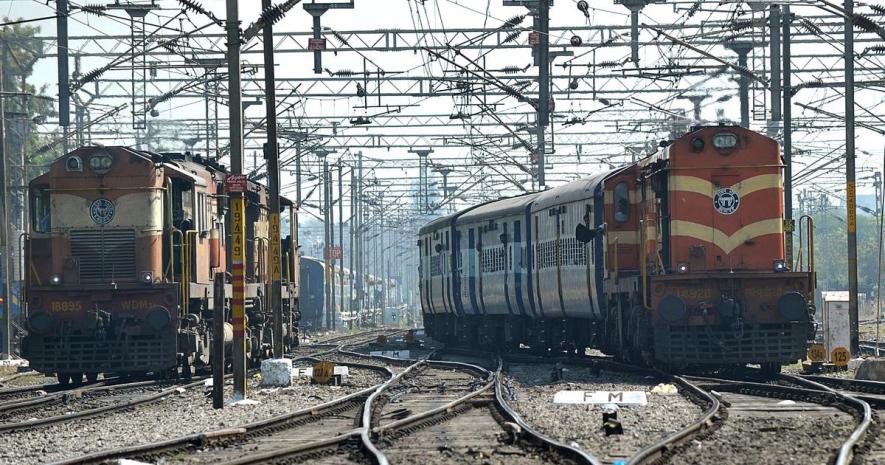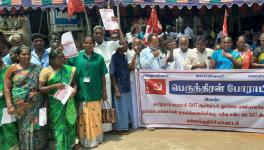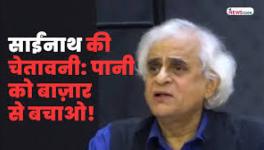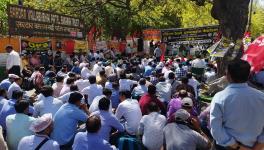Apex Railway Unions Against Move to Corporatise Production Units

Image Courtesy: scroll.in
Apex trade union outfits operating in the Railways are opposed to the Rail Board’s proposal to corporatise its seven production units which, since their respective inception, have been functioning, as originally envisaged, as departmental units. In fact, the Railways itself, barring some of its arms, happens to be the largest departmental undertaking in the country.
The trade unions, including the All India Railwaymen’s Federation (AIRF), National Federation of Indian Railwaymen (NFIR) and Railway Mazdoor Sangh (RMS), clearly suggest that it’s an ill-advised move because the seven production units are doing their job well and if their efforts to persuade the Railway ministry to cease and desist do not yield the desired results, they will not shy away from resorting to “trade union action”.
The seven units are: Chittaranjan Locomotive Works (CLW); Integral Coach Factory (ICF), Perambur; Diesel Locomotive Works (DLW), Varanasi; Diesel Loco Modernisation Works (DMW), Patiala; Rail Wheel Factory (RWF), Bangalore; Rail Coach Factory (RCF), Kapurthala; and Modern Coach Factory (MCF), Rae Bareli. The Railway Board is planning to kick off its plan with MCF.
Also read: CITU Opposes Privatisation of Indian Railways
The plan drawn up by the Railway Board envisages hiving off the seven units and their associated workshops to a government-owned new entity, the Indian Railway Rolling Stock Company under which each individual unit will operate as a profit centre reporting to the Chief Managing Director, who will report to the Railway Board. In its reckoning, the measure will help the units to achieve superior operational efficiency, wider market access and promote exports.
AIRF General Secretary Shiv Gopal Mishra told NewsClick that his organisation was, in principle, opposed to corporatisation and privatisation. “After some years, they will seek to privatise these units. The central trade unions will try their best to dissuade the government, otherwise “we will be forced to resort to trade union action,” Mishra said, adding, “we know how to do it”.
AIRF President Rakhal Dasgupta echoed similar sentiments and said the move had come at a time when there is growing frustration among railwaymen over issues, such as minimum wage and wage structure including fixation formula of the Seventh Central Pay Commission and guaranteed pension including family pension irrespective of the date of appointment.
Terming the move as not in the interest of the Railways itself, NFIR General Secretary Dr M Raghavaiah said, “These are all public assets built with tax payers’ money. More importantly, they were doing a good job, both in quantitative and qualitative terms. MCF’s production cost was lower than the imported cost of comparable coaches. Why should such units be disturbed with corporatisation, and may be, privatisation later?”
Pointing out the issues with private production units, Ashok Shukla, general secretary of the RMS said, “The move is not in the interest of either the public or the employees or the industry. There are several instances to show that private sector production outfits are trailing and, in several cases, those are bailed out by predominantly the public sector banking segment.”
“What about the NCLT (National Company Law Tribunal) cases? Revival packages, firmed up after prolonged delays due to litigation and other hurdles created by the failed management, are forcing banks to accept hefty haircuts. Whose money is being lost ? The tax payers’, isn’t it?,” Shukla asked. “The Railways’ production units are doing well, they have dedicated workforce. They should not be disturbed,” he added.
Also read: Protests at Railways’ MCF in Rae Bareli Against Corporatisation Move
The production units, it may be mentioned, have other branches and segments of the Railways as their main customers. No direct sale is involved, except in the case of non-railway consumers, if any and exports. While abiding by the transfer pricing system, a production loads a certain predetermined amount on to the production cost while supplying to the consuming branch/segment. As these are capital assets, these are subject to depreciation and the relevant deduction is made from the revenues of the Railways.
For the record, a brief profile of the production units is given below:
CLW: Located at Chittaranjan near Asansol and named after freedom fighter and statesman Deshbandhu Chittaranjan Das; production activity started on January 26, 1950. India’s first President Dr Rajendra Prasad dedicated the first steel locomotive to the nation on November 1, 1950. Production started with steam, diversified to diesel and further diversified to electric loco.
ICF, Perambur: This unit was inaugurated by Jawaharlal Nehru on October 2, 1955; the furnishing division came up on October 2, 1962 and has produced well over 500 designs which include series manufacture of high quality stainless steel 3-phase transmission Diesel Electric Multiple Unit (DEMU) train sets. The unit also rolled out the Train 18, the flagship semi-high speed (160 km/ hour) towards end of October 2018 and another aluminium body high speed train set called Train 21 is planned for roll-out in the course of 2021. The unit has gone through extensive modernisation.
DLW Varanasi: Diesel locos imported from American Locomotive Company (ALCO) of the US were introduced in the country in the 1950s; DLW came into being in August 1961 and initially had a collaboration with ALCO. While the first broad gauge loco was released in January 1964, it progressively stepped up production of higher capacities. By January 2007, it had manufactured the 5000th loco AND in February 2012, it produced the first 5500 HP WDG-5 loco. In April 2016, it made the first vacuum-type bio-toilet equipped loco, then in February 2017, it manufactured the first electric loco. In March 2018, it converted two old diesel locos into electric ones – a first in the world.
DML, Patiala: It was originally known as Diesel Component Works, meant to cater to the growing requirement of spares (originally met through imports by DLW) as more and more diesel locos were pressed into service and their size and age increased. As such the need for precision components for maintenance support was being increasingly felt and the decision to set up an exclusive unit was under active consideration by 1979. The foundation stone was laid on October 24, 1981, and production started in 1986. Later, the government decided that the unit will undertake mid-life rebuilding of diesel locos after a service life of 18 years and the name was changed in July 2003 to Diesel Loco Modernisation Works to reflect its job profile.
RWF, Bangalore: Originally known as Wheel & Axle Plant. In early 1970, the Indian Railways felt the need for a captive unit to augment supplies from Durgapur Steel Plant and substitute costly imports of a high percentage of the total requirements. It also caters to the needs of non-railway customers. It established its presence in export markets and shipped its products to American Rail Roads in 1995.
RCF, Kapurthala: Established in 1986, this unit which makes passenger coaches of different types, now accounts for over 35% of total fleet of coaches on the railways. It has developed cost-effective indigenous technology for treatment of biowaste and made LHB (Linke Hofmann Busch) coaches for export to Bangladesh.
MCF, Rae Bareli: Inaugurated on November 7, 2012, this unit suffered considerable delays due to land-related issues and as a result, costs had soared to over Rs 2,500 crore from the initial estimate of Rs 1,685 crore. The unit is equipped to make sophisticated LHB coaches. It started manufacture in the course of 2014 and has plans to make high-speed aluminium coaches.
The writer is an independent journalist based in Kolkata.
Also read: Contractual Workers – A Saga of Neglect by Indian Railways
Get the latest reports & analysis with people's perspective on Protests, movements & deep analytical videos, discussions of the current affairs in your Telegram app. Subscribe to NewsClick's Telegram channel & get Real-Time updates on stories, as they get published on our website.
























